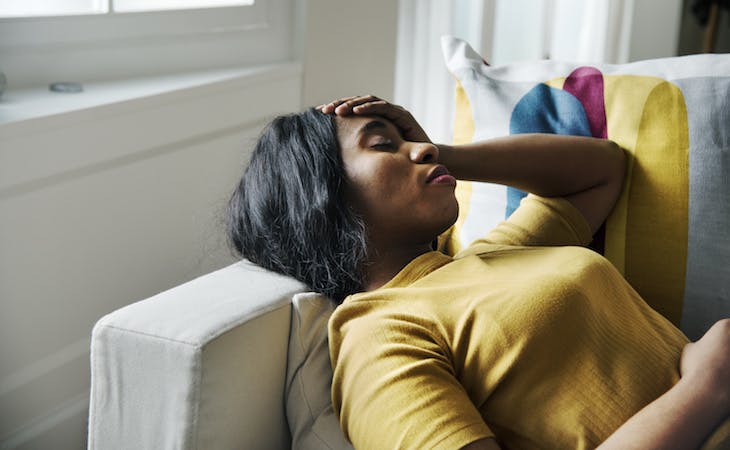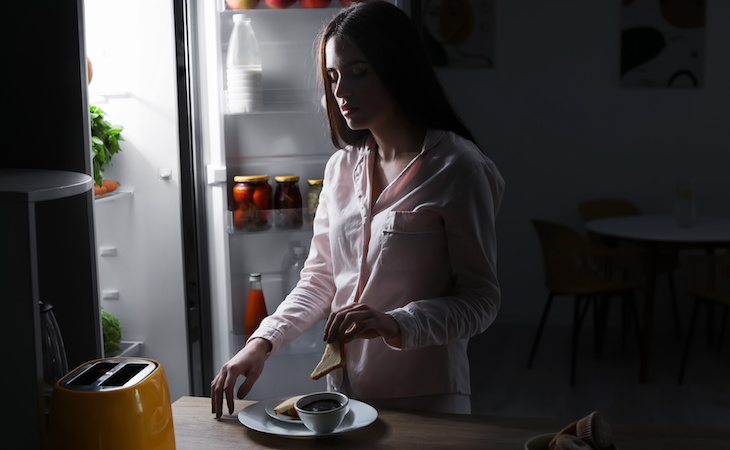If you’ve ever had a headache that felt like more than just the typical pain, you might have experienced a migraine. But how can you tell the difference between a migraine and a run-of-the-mill headache?
“Migraines affect about 12% of the population,” says Anthony Kouri, MD, a surgeon at the University of Toledo Medical Center. Those at highest risk are women, those with a family history of migraines, and those with depression, anxiety, and sleep disorders.”
Migraines can potentially even make it more difficult to sleep. Here’s what you need to know about treating migraines and how to get better shut-eye when you have one.
What are the symptoms of a migraine?
There are four stages of a migraine attack, according to Kouri. These are prodrome, aura, attack, and postdrome. During the prodrome phase, a person might have strange food cravings, mood changes, uncontrollable yawning, and an intense need to urinate.
After that, some people see visual disturbances called auras before a migraine comes on. Auras can look like flashes or blind spots. Others experience tingling in a limb or on one side of their face as well.
Migraine pain itself often comes with a throbbing or pulsing sensation on one side of the head. Other symptoms can include nausea, vomiting, and sensitivity to external stimuli, like light and sound. However, not all migraine suffers experience extreme headaches. “It is possible to have the light and sound sensitivity with nausea and vomiting in the absence of a headache,” Kouri says.
During the postdrome phase, which follows the attack, a person might feel tired, weak, and confused for as long as 24 hours.
Related: Exploding Head Syndrome and other lesser-known sleep disorders
Is there a link between migraines and sleep?
Scientists are still working to understand the relationship between migraines and sleep. There is a strong correlation between high migraine frequency and poor sleep quality, according to a Taiwanese study. The study also showed a higher prevalence of migraines among poor sleepers than in populations with average sleep quality.
Migraines have also been linked to snoring and sleep apnea. People with chronic headaches are almost twice as likely to snore every night as well, according to a study published by the American Academy of Neurology in 2003.
“Migraines and sleep disorders are often in a tangled cycle, with one triggering the other,” says Kouri. “It has been long established that sleep disorders and migraines often go together.”
Kouri explains that a lack of sleep can trigger migraines—and the more migraines you have, the more sleep disturbances you’re going to experience. “If you have a sleep disorder, you are more likely to experience more frequent and more severe migraines,” he explains. “If you chronically have difficulty sleeping, you’re more likely to transition from occasional migraines to chronic migraines.”
While the mechanism between sleep disorders and migraines has been studied quite a bit, there haven’t been any clear answers to explain it just yet, Kouri notes.
Related: A simple way to protect yourself against Alzheimer’s disease
What treatment options are available for migraines?
Before seeking out treatment for migraines, make sure you’ve gotten a proper diagnosis. Schedule an appointment with your doctor if you haven’t already, and they’ll get you started on the road to treating your migraine symptoms.
One of the first things most doctors will have you do is keep a migraine journal. You’ll use it to keep track of the frequency and duration of your migraines as well as their possible triggers, including what you eat and drink, exercise, medications, stress, activities—and anything else you think might be causing your migraines. Finding the one thing that triggers your migraines will be the best-case scenario. If you always get migraines after drinking red wine, goodbye Cabernet and hello headache-free days.
Unfortunately, most migraine sufferers can’t figure out their triggers so easily. If that’s the case for you, your doctor may prescribe a number of pain relievers or medications that have been shown to prevent migraines in some users. These treatments can range from ordinary over-the-counter pain relievers to seemingly odd therapies like Botox injections, which have been approved by the FDA to treat chronic migraines.
How do you sleep better when you’re having a migraine attack?
Sam White, the marketing manager at GT Automotive near Salt Lake City, has been experiencing migraines for years. The change that has made the most difference in his symptoms was buying a new mattress. No, really! And we’re not saying that just so you’ll buy one of ours.
“Helping keep cool is huge for me when I have migraines,” says White, “and the mattress helps so much with that.”
In other words, one of the best things you can do to get a better night’s sleep is to control your surroundings. White keeps cool with a fan, blocks out sound with earplugs, and he also invested in some high-quality blackout curtains.
The experts at the Migraine Trust, a London-based, research-driven charity, also offer this advice for sleeping better when you have a migraine:
- Go to sleep at the same time every night to regulate your circadian rhythm.
- Make your sleep environment as conducive to sleep as possible—that means keeping it as dark and as quiet as you can, as well as making sure your bedding is comfortable.
- Exercise early in the day.
- Stay off your devices before bed, as the blue light emitted from screens interferes with sleep.
- Avoid caffeine and alcohol too close to bedtime.









